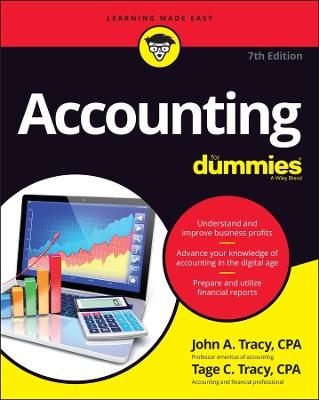
Accounting For Dummies
For Dummies (Verlag)
978-1-119-83752-7 (ISBN)
Accounting For Dummies is the perfect place to start, whether you're operating a small business, just need help managing the family budget, or you're a rising star in corporate America. It's a financial blueprint for the everyday person, easy-to-understand, and full of practical advice.
You'll learn the basic ABC's of accounting, how to read and understand financial statements, create best in class budgets & forecasts, craft profitable business plans, take control of your own finances, gain insight on how companies get money from investors and banks, and avoid common money mistakes that trip up even the best of us. You'll also find out how to:
Diagnose the financial health of your business and make a realistic plan to grow your company
Improve your own or your family's money situation with sound financial planning and understanding
Understand each of the three basic financial statements and what they say about a company's past, present, and future
Enhance your knowledge of how accounting functions and operates in today's digital age and cloud-based world
As a useful tool for business or as a guide to your personal finances, nothing compares to accounting mastery. And once you've nailed the basics, you'll wonder how you ever lived without this universal and beautiful language.
John A. Tracy, CPA, is an award-winning professor emeritus of accounting at the University of Colorado at Boulder. He has authored The Fast Forward MBA in Finance, 2nd Edition, and Accounting Workbook For Dummies. Tage C. Tracy, CPA, operates a financial consulting firm focused on offering CFO support and planning services to private companies. He is the author of Business Financial Information Secrets and has coauthored several For Dummies titles.
Introduction 1
Part 1: Opening the Books on Accounting 5
Chapter 1: Accounting in Today’s New Economy 7
Chapter 2: Introducing Financial Statements 29
Chapter 3: Safeguarding Company Assets 53
Chapter 4: Accounting in the Digital Age 75
Chapter 5: Recognizing the Legal and Accounting Entity 89
Part 2: Exploring Financial Statements 109
Chapter 6: Reporting Profit or Loss in the Income Statement 111
Chapter 7: Reporting Financial Condition in the Balance Sheet 137
Chapter 8: Reporting Cash Sources and Uses in the Statement of Cash Flows 161
Chapter 9: Financial Accounting Issues 183
Part 3: Understanding Financial Reports, Financial Statements, and Financial Information 207
Chapter 10: Producing Financial Reports 209
Chapter 11: Deciphering a Financial Report 231
Chapter 12: Analyzing Financial Information with Ratios 245
Chapter 13: Generating Internal Financial Information for Management Use 267
Chapter 14: Applying Wall Street’s Tricks and Treats to Engineer Financial Results 289
Part 4: Leveraging Accounting in Managing a Business 301
Chapter 15: Analyzing Profit 303
Chapter 16: Accounting for Costs 325
Chapter 17: Preparing Best-in-Class Forecasts, Projections, and Budgets 347
Chapter 18: Capitalizing a Business: How, When, Why, and What 369
Part 5: The Part of Tens 397
Chapter 19: Ten Tips for Managers 399
Chapter 20: Ten Tips for Reading a Financial Report 409
Index 419
| Erscheinungsdatum | 07.03.2022 |
|---|---|
| Sprache | englisch |
| Maße | 188 x 231 mm |
| Gewicht | 612 g |
| Themenwelt | Wirtschaft ► Betriebswirtschaft / Management ► Rechnungswesen / Bilanzen |
| ISBN-10 | 1-119-83752-9 / 1119837529 |
| ISBN-13 | 978-1-119-83752-7 / 9781119837527 |
| Zustand | Neuware |
| Informationen gemäß Produktsicherheitsverordnung (GPSR) | |
| Haben Sie eine Frage zum Produkt? |
aus dem Bereich


